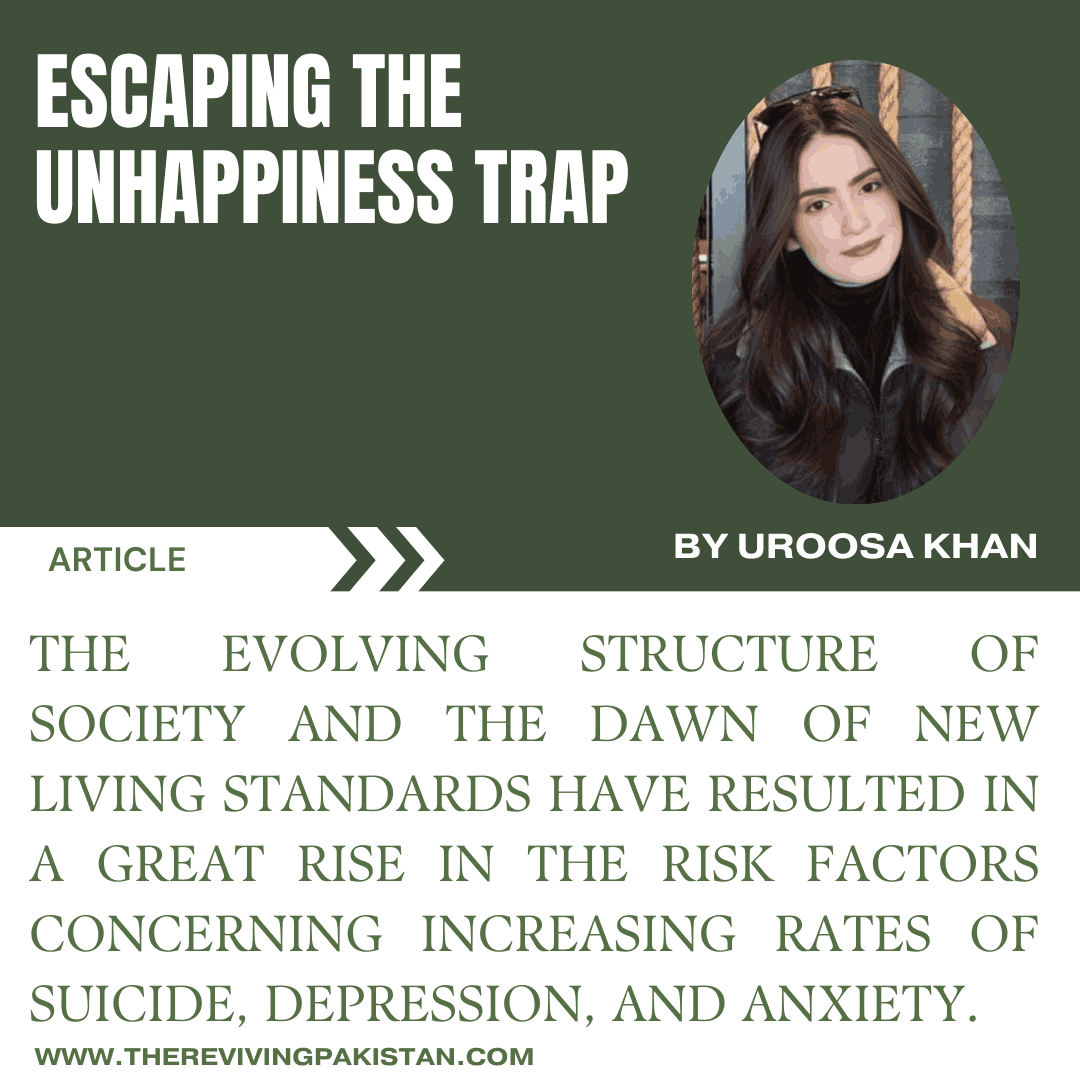About the Author(s)

Uroosa Khan
The author is an independent researcher having keen interest in foreign policy, geopolitics, and international relations.
The evolving structure of society and the dawn of new living standards have resulted in a great rise in the risk factors concerning increasing rates of suicide, depression, and anxiety. More and more people all over the world are getting increasingly frustrated while not feeling as happy as they earlier did. A few fundamental problems are contributory to this worldwide trend.
The major issue lies in the fact that nowadays, a lot of people try to seek their happiness somewhere outside themselves-through recognition and gratitude from other people. At the same time, dependence on other people for their happiness fosters low self-love and lessens one’s ability to find satisfaction in themselves. According to Viktor Frankl, “When a person can’t find a deep sense of meaning, he distracts himself with pleasure.” This emphasizes the necessity to search for meaning within, which underlies any genuine feeling of happiness. It is also usually accompanied by superficial happiness devoid of satisfaction of any sort.
When they share with me this growing dissatisfaction and stress, I give them two major pieces of advice: one, find happiness within yourself, and two, be productive at work. A similar view was shared by the philosopher Epicurus when he admonished, “Do not spoil what you have by desiring what you have not; remember that what you now have was once among the things you only hoped for.” This view engenders appreciation and contentment with one’s lot in life, which is a sure way to inner peace and contentment.
The other key contributor to the all-pervasive dissatisfaction in society is the failure to engage positively, especially among the youth. Most of the teens simply while away their day over social media and do not take part in any kind of meaningful activity. Social media, with its instant-gratification attitude, can have many bad impacts on the mind as it projects a very unrealistic view of things. It instills in them feelings of inadequacy and inferiority, as people often compare their lives to what these celebrities and influencers post as flawless.
Arthur Schopenhauer once said, “No satisfaction is lasting; it is always only the starting point of a new striving.” He grasped this never-ending cycle of desires and dissatisfaction-which, after having attained it, one again feels unsatisfied, and so on in the pursuit of more that often is unsatisfactory. Ironically, the digital age has succeeded in making an individual isolated from others despite connecting them virtually. The loneliness of many people around the globe has developed due to lack of real, substantial contact amongst people that is being replaced by superficial online communications. Scientists indicate that higher consumption of social media is consistently associated with “feeling” more lonely, or with various measures of social isolation-both of which appear to be associated with unhappiness.
The point, in this regard, relates to Jean-Paul Sartre’s existential idea of angst. As he said, “Man is condemned to be free; because once thrown into the world, he is responsible for everything he does.” In the digital age, the overwhelming array of choices and responsibility for navigating them create anxiety and a sense of loneliness. The paradox of choice goes on to develop decision fatigue, which diminishes the possibilities of individuals finding their lives satisfying and contenting.
The factor that only adds to this all-spread unhappiness is changing social interactions. If a long time ago, people came together as close-knit communities spending time with each other, having face-to-face conversations, and forming strong social bonds, today social interactions seem to have taken a toll by moving toward going virtual. Quite often, online followers and virtual friends take precedence over real-life relationships. This, in turn, has weakened the very fabric of society that was supposed to support mental well-being and replaced it with feelings of isolation and disconnection.
Erich Fromm commented on this social trend, showing how the emphasis of modern society on material possessions leads to dissatisfaction and a lack of fulfillment. He says in his book “To Have or To Be?”, “Greed is a bottomless pit which exhausts the person in an endless effort to satisfy the need without ever reaching satisfaction.” The insatiable lust after material wealth and status, propelled by consumerism, has more often than not resulted in feelings of vacuity when people finally come to realize that material goods can never bring lasting happiness.
Likewise, modern lifestyles have reduced outdoor exposure and physical activities. People have generally become indoor persons where they avoid physical activities and sunlight, two very significant contributors to health. The mere act of being exposed to nature, considered as grounding, was found to reduce stresses, anxieties, and depressions. Furthermore, all these positive practices have been ignored due to the pressures that modern life has imposed.
As the Dalai Lama said, “We need to learn how to want what we have, not to have what we want, in order to get stable and steady happiness.” His message puts a strong emphasis on contentment and being mindful: to be content with the present moment and finding delight in the little things of life.
Thus, to find the source of general dissatisfaction and unhappiness in society, one needs to consider the interplay of factors: seeking happiness in others, lack of self-love, social media, and disintegration of more traditional structures of sociability. It is the self-satisfaction answer, productive work, and rebuilding social connectedness. This may be fostered through the creation of a sense of community, encouraging gratitude, and the facilitation of lifestyles that balance physical activity and time in nature.
As Bertrand Russell has so eloquently put it, “To be without some of the things you want is an indispensable part of happiness.” Recognizing our limitations and accepting them, appreciating what we have, and finding joy in the moment are ways to develop our contentment. If these values are embraced, then society can truly begin to find a root cure for causes of unhappiness and seek to create a more positive, fulfilled environment for all.
It thus follows that the path to happiness does not lie in the perpetual pursuit of appreciation from all quarters but, instead, in the building of deep self-awareness, thankfulness, and connection with others. By focusing on these basic elements of well-being, true happiness can be encountered, and more fulfilling lives can be realized.

